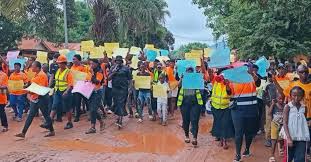The recent mass dismissal of over 1,000 Sierra Leonean workers by Koidu Holdings Limited has reignited urgent national discourse around foreign mining operations and the ownership of Sierra Leone’s vast natural resources.
The fallout from the sackings, which followed peaceful protests over poor wages and unsafe working conditions, has exposed deep structural flaws in the country’s mining sector, prompting calls for the government to undertake a comprehensive review of all existing mining agreements.
The workers’ demands were clear: fair pay, a safe working environment, and basic respect for their rights as citizens and employees. Instead, they were met with what labour advocates and community leaders have described as a brutal corporate backlash—mass terminations and zero accountability.
The response has sparked outrage, not only among workers and unions but also within civil society, with growing condemnation of what is widely seen as unchecked exploitation by foreign-owned mining companies operating in Sierra Leone.
According to labour rights defenders, the actions of Koidu Holdings—a subsidiary of Octea Mining, itself owned by the controversial Israeli billionaire Beny Steinmetz—are symptomatic of a broader and long-standing issue: the systemic marginalization of Sierra Leoneans in the ownership and management of their own mineral wealth.
“The Koidu mine dispute is not just about one company’s misconduct,” said Marcus Bangura, a human rights activist based in Freetown. “It’s a mirror held up to our entire extractive sector. We have allowed foreign companies to control the lion’s share of our diamonds, gold, rutile, iron ore and bauxite, leaving citizens with crumbs and toxic legacies,” he said
He argues that successive governments have failed to enforce stringent compliance with international labour standards, as outlined in the International Labour Organization’s (ILO) conventions, which affirm the right to collective bargaining, decent work, and a safe environment. Despite Sierra Leone being a signatory to these treaties, enforcement remains weak and accountability elusive.
The situation at Koidu Holdings has now catalyzed a broader public demand for the government to re-examine the very foundation of its relationship with foreign investors. Key among these demands is a call for parliament to launch a full-scale legislative review of all mining leases, tax exemptions, and export contracts—many of which were negotiated under opaque conditions that critics argue do not serve the public interest.
“We need a mining regime built on transparency, equity, and national ownership,” said Sahr Brima from Kono district. “The people who live where these resources are extracted must be the first beneficiaries; not the last.”
This sentiment is gaining traction not only in Kono, where the Koidu mine is located, but nationwide. Community-based organizations and policy think tanks have reportedly joined the chorus, calling for the operationalization the Mineral Wealth Fund to manage revenues from mineral exports, and for legislative reforms that would mandate minimum equity participation by Sierra Leoneans in all large-scale mining operations.
The First Lady, who has publicly stood in solidarity with the sacked workers, has further emphasized the moral urgency of this crisis. In earlier social media posts, she called on the government to choose justice over silence and urged multinational companies to respect the dignity and rights of Sierra Leonean workers.
As tensions continue to rise in Kono and pressure mounts on State House, the government’s response in the coming days will signal either a turning point in the fight for resource sovereignty or a continued descent into a status quo where wealth flows out, and injustice festers within.



